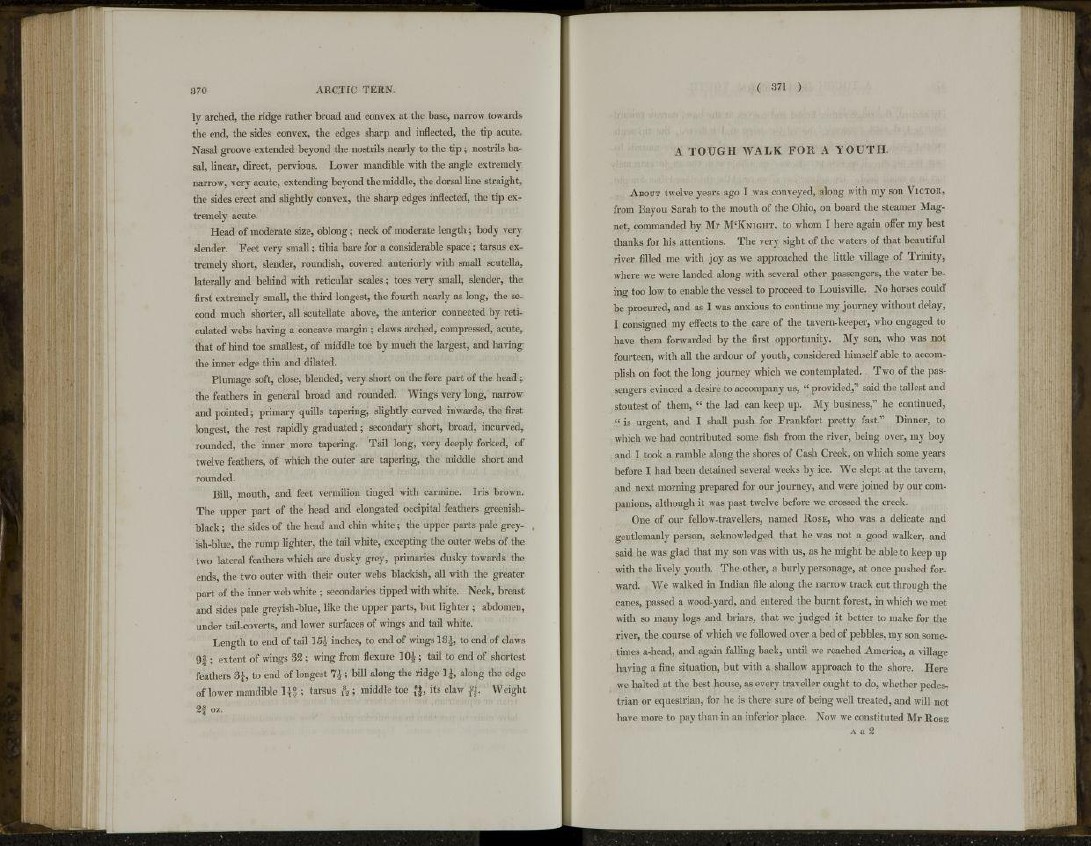
370 ARCTIC TERN.
ly arched, the ridge rather broad and convex at the base, narrow towards
the end, the sides convex, the edges sharp and inflected, the tip acute.
Nasal groove extended beyond the nostrils nearly to the tip; nostrils basal,
linear, direct, pervious. Lower mandible with the angle extremely
narrow, very acute, extending beyond the middle, the dorsal line straight,
the sides erect and slightly convex, the sharp edges inflected, the tip extremely
acute.
Head of moderate size, oblong; neck of moderate length; body very
slender. Feet very small; tibia bare for a considerable space; tarsus extremely
short, slender, roundish, covered anteriorly with small scutella,
laterally and behind with reticular scales; toes very small, slender, the
first extremely small, the third longest, the fourth nearly as long, the second
much shorter, all scutellate above, the anterior connected by reticulated
webs having a concave margin ; claws arched, compressed, acute,
that of hind toe smallest, of middle toe by much the largest, and having
the inner edge thin and dilated.
Plumage soft, close, blended, very short on the fore part of the head ;
the feathers in general broad and rounded. Wings very long, narrow
and pointed; primary quills tapering, slightly curved inwards, the first
longest, the rest rapidly graduated; secondary short, broad, incurved,
rounded, the inner more tapering. Tail long, very deeply forked, of
twelve feathers, of which the outer are tapering, the middle short and
rounded.
Bill, mouth, and feet vermilion tinged with carmine. Iris brown.
The upper part of the head and elongated occipital feathers greenishblack
; the sides of the head and chin white; the upper parts pale greyish
blue, the rump lighter, the tail white, excepting the outer webs of the
two lateral feathers which are dusky grey, primaries dusky towards the
ends, the two outer with their outer webs blackish, all with the greater
part of the inner web white ; secondaries tipped with white. Neck, breast
and sides pale greyish-blue, like the upper parts, but lighter; abdomen,
under tail-coverts, and lower surfaces of wings and tail white.
Length to end of tail 15.} inches, to end of wings 13^, to end of claws
9 | ; extent of wings 32 ; wing from flexure 10£ ; tail to end of shortest
feathers 3£, to end of longest 7^; bill along the ridge 1£, along the edge
of lower mandible l\?2 ; tarsus ^ ; middle toe {J, its claw T
2|. Weight
2f oz.
( 371 )
A T O U G H W A L K F O R A Y O U T H .
ABOUT twelve years ago I was conveyed, along with my son VICTOR,
from Bayou Sarah to the mouth of the Ohio, on board the steamer Magnet,
commanded by Mr M'KNIGHT, to whom I here again offer my best
thanks for his attentions. The very sight of the waters of that beautiful
river filled me with joy as we approached the little village of Trinity,
where we were landed along with several other passengers, the water being
too low to enable the vessel to proceed to Louisville. No horses could
be procured, and as I was anxious to continue my journey without delay,
I consigned my effects to the care of the tavern-keeper, who engaged to
have them forwarded by the first opportunity. My son, who was not
fourteen, with all the ardour of youth, considered himself able to accomplish
on foot the long journey which we contemplated. Two of the passengers
evinced a desire to accompany us, " provided,"" said the tallest and
stoutest of them, " the lad can keep up. My business," he continued,
" is urgent, and I shall push for Frankfort pretty fast." Dinner, to
which we had contributed some fish from the river, being over, my boy
and I took a ramble along the shores of Cash Creek, on which some years
before I had been detained several weeks by ice. We slept at the tavern,
and next morning prepared for our journey, and were joined by our companions,
although it was past twelve before we crossed the creek.
One of our fellow-travellers, named ROSE, who was a delicate and
gentlemanly person, acknowledged that he was not a good walker, and
said he was glad that my son was with us, as he might be able to keep up
with the lively youth. The other, a burly personage, at once pushed forward.
We walked in Indian file along the narrow track cut through the
canes, passed a wood-yard, and entered the burnt forest, in which we met
with so many logs and briars, that we judged it better to make for the
river, the course of which we followed over a bed of pebbles, my son sometimes
a-head, and again falling back, until we reached America, a village
having a fine situation, but with a shallow approach to the shore. Here
we halted at the best house, as every traveller ought to do, whether pedestrian
or equestrian, for he is there sure of being well treated, and will not
have more to pay than in an inferior place. Now we constituted Mr ROSE
A a 2